A Dynamic Model of Employees’ Transition to Entrepreneur: A Cognitive Mapping Approach
IF 4.6
3区 管理学
Q1 MANAGEMENT
引用次数: 2
Abstract
Employees’ transition to an entrepreneurial career has been explained by two major driving forces: push and pull factors. The push-pull dichotomy, however, has been the center of debate on whether the classification is incomplete and ambiguous. Until this debate is resolved, the dynamic and fluid nature of the influencing factors and their relationships remains unclear. The purpose of this research is to discuss the legitimacy of the push-pull dichotomy in explaining the motivations and processes of employees’ transition to an entrepreneurial career. To achieve this, a cognitive mapping approach to synthesize the factors from the extant empirical studies was employed. Analysis of 26 articles revealed that categories of push and pull factors in prior research are neither mutually exclusive nor clearly separate. Our dynamic model of employees’ transition to an entrepreneurial career illustrates the reciprocal, compounding, and counter-effective influence of factors. This research sheds light on the dynamic interrelationship among factors affecting employees’ transition to an entrepreneurial career.员工向企业家转变的动态模型:认知映射方法
员工向创业生涯的转变有两大驱动力:推动因素和拉动因素。然而,推拉二分法一直是关于分类是否不完整和模糊的争论中心。在这场争论得到解决之前,影响因素及其关系的动态和流动性仍不清楚。本研究的目的是讨论推拉二分法在解释员工向创业生涯过渡的动机和过程方面的合法性。为了实现这一点,采用了认知映射方法来综合现有实证研究中的因素。对26篇文章的分析表明,先前研究中的推拉因素既不是相互排斥的,也不是明确分开的。我们的员工向创业生涯过渡的动态模型说明了因素的相互、复合和反作用影响。这项研究揭示了影响员工向创业生涯过渡的因素之间的动态相互关系。
本文章由计算机程序翻译,如有差异,请以英文原文为准。
求助全文
约1分钟内获得全文
求助全文
来源期刊

Human Resource Development Review
MANAGEMENT-
CiteScore
9.60
自引率
17.20%
发文量
35
期刊介绍:
As described elsewhere, Human Resource Development Review is a theory development journal for scholars of human resource development and related disciplines. Human Resource Development Review publishes articles that make theoretical contributions on theory development, foundations of HRD, theory building methods, and integrative reviews of the relevant literature. Papers whose central focus is empirical findings, including empirical method and design are not considered for publication in Human Resource Development Review. This journal encourages submissions that provide new theoretical insights to advance our understanding of human resource development and related disciplines. Such papers may include syntheses of existing bodies of theory, new substantive theories, exploratory conceptual models, taxonomies and typology developed as foundations for theory, treatises in formal theory construction, papers on the history of theory, critique of theory that includes alternative research propositions, metatheory, and integrative literature reviews with strong theoretical implications. Papers addressing foundations of HRD might address philosophies of HRD, historical foundations, definitions of the field, conceptual organization of the field, and ethical foundations. Human Resource Development Review takes a multi-paradigm view of theory building so submissions from different paradigms are encouraged.
 求助内容:
求助内容: 应助结果提醒方式:
应助结果提醒方式:


